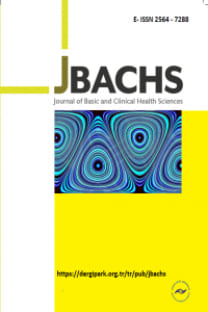Evaluation of University Students’ Nutritional Knowledge Attitudes and Behaviors
Evaluation of University Students’ Nutritional Knowledge Attitudes and Behaviors
___
- Hilger J, Loerbroks A. Diehl K. Eating behaviour of university students in Germany: Dietary intake, barriers to healthy eating and changes in eating behaviour since the time of matriculation. Appetite 2017;109:100–107. [CrossRef]
- Baldini M, Pasqui F, Bordoni A, Maranesi M. Is the Mediterranean lifestyle still a reality? Evaluation of food consumption and energy expenditure in Italian and Spanish university students. Public Health Nutr 2009;12:148–155. [CrossRef]
- Kowalkowska J, Wadolowska L, Wuenstel JW, Słowinska MA, Niedzwiedzka E. Socioeconomic status and overweight prevalence in polish adolescents: The impact of single factors and a complex index of socioeconomic status in respect to age and sex. Iran J Public Health 2014;43:913–925. https://www.ncbi.nlm.nih.gov/pmc/articles/ PMC4401056/
- Deliens T, Clarys P, De Bourdeaudhuij I, Deforche B. Determinants of eating behaviour in university students: A qualitative study using focus group discussions. BMC Public Health 2014;14:53. [CrossRef]
- Achinihu G. Nutritional status of University students in South-Eastern states of Nigeria. Journal of Research in National Development 2010;7:25–32. [CrossRef]
- Ganasegeran K, Al-Dubai SA, Qureshi AM, Al-Abed AAA, Rizal AM. Aljunid SM. Social and psychological factors affecting eating habits among university students in a Malaysian medical school: A crosssectional study. Nutr J 2012;11:48. [CrossRef]
- Choi SN, Chung NY. Bone density, nutrient intake, blood composition and food habits in non-smoking and non-alcohol drinking male university students. Korean J Food Cult 2010;25:389–399.
- World Health Organization. Global Nutrition Monitoring Framework: Operational guidance for tracking progress in meeting targets for 2025. Geneva, Switzerland 2017. https: //apps. who. int / iris / bitstream / handle / 10665/259904 / 9789241513609 - eng.pdf; jsessionid = 1755EC007C8E19F8FA2A3D29FADC8B4F? sequence =1
- Górska-Kłęk L, Mełeszko K, Berner E. Prozdrowotne elementy stylu życia studentów Akademii Wychowania Fizycznego i Uniwersytetu Ekonomicznego. Acta Bio -Optica et Informatica Medica 2011;17:268–274.
- 10. Silva DAS, Petroski EL. The simultaneous presence of health risk behaviors in freshman college students in Brazil. J Community Health 2012;37:591–598. [CrossRef]
- 11. Cefai C, Camilleri L. The dietary habits of Maltese university students. Malta Med J 2011;23:7–12. https://pdfs.semanticscholar.org/8834/ acac19b60f672bfc06be7933da895332418f.pdf
- 12. Van den Berg VL, Abera BMM, Nel M, Walsh CM. Nutritional status of undergraduate healthcare students at the University of the Free State. South African Fam Pract 2013;55:445–52. [CrossRef]
- 13. El Ansari W, Berg-Beckhoff G. Country and Gender-Specific Achievement of Healthy Nutrition and Physical Activity Guidelines: Latent Class Analysis of 6266 University Students in Egypt, Libya, and Palestine. Nutrients 2017;9:738. [CrossRef]
- 14. Yun TC, Ahmad SR, Quee DKS. Dietary Habits and Lifestyle Practices among University Students in Universiti Brunei Darussalam. Malays J Med Sci 2018;25:56–66. [CrossRef]
- 15. Alves HJ, Boog MCF. Food behavior in student residence halls: A setting for health promotion. Revista de Saude Publica 2007;41:197204. [CrossRef]
- 16. Moy FM, Surin J, Ismail Y, Mahad R, Tie FH, Wan Ismail WMA. Breakfast skipping and its associated factors among undergraduates in a public university in Kuala Lumpur. Malaysian J Nutr 2009;15:165174.
- 17. Omage K, Omuemu VO. Assessment of dietary pattern and nutritional status of undergraduate students in a private university in southern Nigeria. Food Sci Nutr 2018;22;6:1890–1897. [CrossRef]
- 18. Teleman AA, de Waure C, Soffiani V, Poscia A, Di Pietro ML. Nutritional habits in Italian university students. Ann Ist Super Sanita 2015;51:99–105. [CrossRef]
- 19. Yahia N, Achkar A, Abdallah A, Rizk S. Eating habits and obesity among Lebanese university students. Nutr J 2008;7:32. [CrossRef]
- 20. Sajwani RA, Shoukat S, Raza R, et al. Knowledge and practice of healthy lifestyle and dietary habits in medical and non-medical students of Karachi, Pakistan. J Pak Med Assoc 2009;59:650–655. https://jpma.org.pk/article-details/1812?article_id=1812
- 21. Partida S, Marshall A, Henry R, Townsend J, Toy A. Attitudes toward Nutrition and Dietary Habits and Effectiveness of Nutrition Education in Active Adolescents in a Private School Setting: A Pilot Study. Nutrients 2018;10:1260. [CrossRef]
- 22. Neslişah R, Emine AY. Energy and nutrient intake and food patterns among Turkish university students. Nutr Res Pract 2011;5:117–123. [CrossRef]
- 23. Payahoo L, Nikniaz Z, Mahdavi R, Asghari Jafar Abadi M. Perceptions of medical sciences students towards probiotics. Health Promot Perspect 2012;2:96–102. [CrossRef]
- 24. Buxton C, Davies A. Nutritional knowledge levels of nursing students in a tertiary institution: lessons for curriculum planning. Nurse Educ Pract 2013;13:355–360. [CrossRef]
- Yayın Aralığı: Yılda 3 Sayı
- Başlangıç: 2016
- Yayıncı: DOKUZ EYLÜL ÜNİVERSİTESİ
Yeliz KILINÇ, Sara Samur ERGÜVEN, Figen Çizmeci ŞENEL, Serpil KARAOĞLANOĞLU
The Examination of the Relationship Between Flexibility andStability of Trunk in Older Adults
Hande ŞENOL, Mehmet DURAY, Şule ŞİMŞEK, Nesrin YAĞCI
Safiye AKTAS, Mustafa Mahmut BARİS, Mustaf SECİL, Kursat SİMSEK, Efe SERİNAN, Meryem CALİSİR, Osman YİLMAZ, Sevgi KİLİC OZDEMİR
Mehmet DURAY, Şule ŞİMŞEK, Nesrin YAĞCI, Hande ŞENOL
Evaluation of University Students’ Nutritional Knowledge Attitudes and Behaviors
Zafer AYBEK, Hülya AYBEK, Nazlı ÇİL, Esin AVCI
Evaluation of Daily Rhythm in High School Children
Evaluation of Dental Anxiety Before Oral Surgery in Epileptic Patients
Serpil KARAOĞLANOĞLU, Figen ÇİZMECİ ŞENEL, Yeliz KILINÇ, Sara Samur ERGÜVEN
